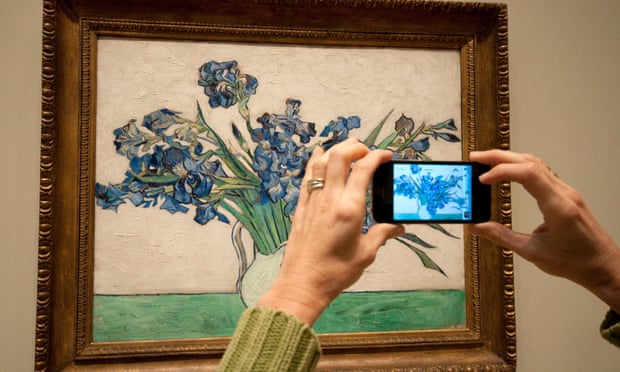Week 3: Robotics + Art
This week Professor Vesna focused on evaluating the effect of industrialization, and the attitude towards robots throughout history. As industrialization progressed, there were different perspectives on this automation during different times (Vesna).
Sala, Riccardo. Art, Aura and the Doomed Search for the Perfect Selfie, Guardian News & Media, https://www.theguardian.com/commentisfree/2019/aug/22/art-aura-doomed-search-perfect-selfie.
For example, in the 1930s, philosopher Walter Benjamin disapproved of the production of technology that would be able to mass produce products of art (Benjamin). He argued that mass producing products would make each product lose its uniqueness, which he referred to as “aura.”
This opinion was not shared by all, especially after World War II, where the advancement of technology was now associated with power. In fact, in Japanese culture technology became idealized, and viewed as heroic and admirable (Kusahara). This can be proved by the creation of a popular comic book series called “Astro Boy.” The plot behind this series was a boy who was created by scientists (which also plays on the identity of a cyborg as mentioned in the lectures), resulting in him having super powers (The Robot Hall of Fame). This comic series later became a show that was broadcasted to over fifty countries, encouraging children to pursue science and embrace technology. Furthermore, it portrayed the atom as admirable and impressive, alluding to the nuclear bombs that Japan had just faced.
One interesting point to note about Astro Boy is that the creator, Osamu Tezuka, came from a science background himself (Tezuka Osamu Official). In fact, Tezuka was a doctor, but chose to pursue animation instead. It is interesting to think about the impact of this decision: through animation, a form of art, Tenzuka was able to inspire millions of children to accept industrialization and robots rather than interacting with patients one by one.
Limit Your Child's TV Time, 30 Dec. 2013, https://www.asiaone.com/singapore/limit-your-childs-tv-time.
Overall, I think industrialization and robots are looked at positively now. The use of artificial intelligence to build robots is being funded and being worked on internationally (Hanson). In fact, robots may even become companions for humans in the future. David Hanson’s project evolves around building robots that show emotions, and are able to reciprocate feelings. Who knows what the world will look like in the future?
Rohwer-Kahlmann, Malte. The Future, the Robots, and... Us?, DW, https://www.dw.com/en/the-future-the-robots-and-us/a-38067125.
Works Cited
“About Tezuka Osamu|Tezuka Osamu Official.” TezukaOsamu.net(EN), TEZUKA PRODUCTIONS, https://tezukaosamu.net/en/about/.
“Astro Boy.” The Robot Hall of Fame - Powered by Carnegie Mellon University, Carnegie Mellon, http://www.robothalloffame.org/inductees/04inductees/astro_boy.html#:~:text=ASTRO%20BOY%2C%20originally%20named%20Tetsuwan,and%20runs%20almost%205%2C000%20pages.
Benjamin, Walter, and Harry Zohn. The Work of Art in the Age of Mechanical Reproduction: An Influential Essay of Cultural Criticism ; the History and Theory of Art. Adansonia Press, 2018.
Hanson, David. “Robots That ‘Show Emotion.’” David Hanson: Robots That "Show Emotion" | TED Talk, TED Conferences, Feb. 2009, https://www.ted.com/talks/david_hanson_robots_that_show_emotion.
Kusahara, Machiko, director. Professor Machiko Kusahara on Japanese Robotics. 3a-Robotics-MachikoKusahara.mov from Art|Sci Center on Vimeo, https://player.vimeo.com/video/698362126?h=5d458ffc33%5C. Accessed 12 Apr. 2022.
Vesna, Victoria, director. DESMA 9: 3-Robotics-pt2 from Art|Sci Center on Vimeo, UCLA Art | Sci Center, https://player.vimeo.com/video/698327733?h=ab13a27c20%5C. Accessed 12 Apr. 2022.





Hi Vivek,
ReplyDeleteIt's really interesting how views on industrialization and mechanization have changed as technology has become more advanced. It's really difficult to picture a world in which images couldn't become duplicated, or instances in which art does not rely on any piece of technology. I've never heard of Astro Boy prior to reading your post, but it was really interesting to learn about its contribution to this topic. It also connects to Week 1's topic regarding science and the arts, showcasing how the two subjects can be combined to create something wonderful. The future of robots makes me a bit weary, but I'm also excited to see how far technology can progress and what will be able to happen as time goes on. Overall, I really enjoyed your post!
Hi Vivek! Your post was incredibly informative and thought-provoking - I’ve never thought about opening a discussion on topics like “aura” but it’s definitely an interesting conversation to be held! I think this would be a very intriguing perspective to bring to a topic outside of mass-production, such as the internet. In such a social-media forward world today, the concept of “stopping to smell the roses”, or enjoy a moment or product’s aura, is such a foreign concept. Originality and authenticity on the internet, as well as real life, have seemed to take on mimicry, simply reproducing what seems to be unique and therefore, losing its uniqueness, beating a dead horse, essentially. I wonder how we can retain that “aura”, as defined by Benjamin, while still embracing progress and productivity?
ReplyDeleteThe history of a comic I’m familiar with, Astro Boy, is equally as surprising, something I honestly did not expect, referring to both the nuclear bombs as well as the creator’s own shift in careers. I appreciate your comment on being able to help more people through art than individually through patients, and I think it demonstrates a strong case referring back to our discussions on two cultures in week 1, embracing the balance between art and science, and creating a stronger force by connecting the two.
Hi Vivek! I appreciate your progression of ideas of how industrialization affected art and robotics over time. It is so interesting to see the contrast of Benjamin's disagreement with mass-produced art, and examples of robots being glorified like in Astro Boy, like you mentioned in your post. Overall, I agree with your opinion on how industrialization and robots can be looked at positively. In today's time, so much has been accomplished due to robots and the growth of industrialization. Great job!
ReplyDelete